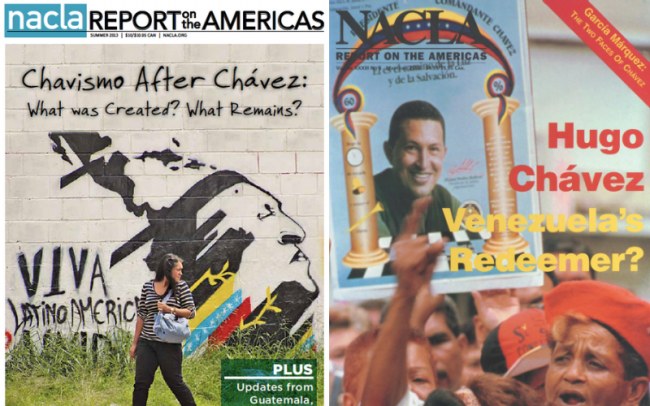
In our Spring 2022 issue of the NACLA Report, we look back at the 20 years since the April 2002 coup in Venezuela to explore what Chavismo meant and wrought for Venezuela, the Americas, and the Left. This selection from our archives of writings on Hugo Chávez and Chavismo offers further reading for contextualizing and understanding Venezuelan politics over the span of two decades.
The Two Faces of Hugo Chávez (2000)
Gabriel García Marquez
Speaking with Hugo Chávez, Gabriel García Márquez discovers “a personality that did not correspond at all to the despotic image we get through the media.” Which was real?
Refounding the Republic the Political Project of Chavismo (2000)
Margarita López-Maya and Luis E. Lander
After a year in power, Chávez and his program for change retain a great deal of popular support. What makes Chávez deserving of such popular fervor?
Polarized Politics Chávez’s Venezuela (2000)
Steve Ellner
After four decades of the alternating rule of Venezuela's traditional parties, the country's politics polarized into pro-Chavez anti-Chavez movements.
Well of Contention: Oil in the Americas (2001)
NACLA Editors
In the oil-producing countries of Latin America, struggles over oil raise a host of fundamental questions: Who profits? Who bears the costs?
The Remarkable Rise and Fall of Hugo Chávez (2002)
Steve Ellner and Fred Rosen
In the wake Venezuela’s dramatic April 2002 coup and counter-coup, many questioning remained—including the political nature of Chávez's opposition and the role of the United States.
Venezuela: The Revolution Will Not Be Televised (2002)
Jon Beasley-Murray
The privately-owned networks ran soap operas and variety shows while thousands of Venezuelans took to the streets to demand Hugo Chávez's return.
Venezuela’s Oil Reform and Chávismo (2002)
Luis Lander and Margarita López-Maya
A struggle for control of the state-owned oil company set the stage for Venezuela’s April 2002 coup.
The Revolutionary Imagination in Cuba and Venezuela (2009)
Sujatha Fernandes
In both Cuba and Venezuela, the revolutionary imagination has been free to develop in the domain of culture, preserving the legacy of struggle and serving as the social conscience of leftist governments.
Chávez and the Intellectuals (2012)
Dan Hellinger
An informal group of Venezuelan intellectuals have been expressing the fear that Chávez’s “hyper-leadership” may be threatening the gains of Chávez’s own Bolivarian Revolution.
Communes in Progress: An Interview with Atenea Jiménez (2013)
Alejandro Velasco and Atenea Jiménez
Building the so-called “communal state” was among the most ambitious—and controversial—goals of the Bolivarian Revolution. National spokesperson of the Network of Communers discusses the movement.
The Communal State: Communal Councils, Communes, and Workplace Democracy (2013)
Dario Azzellini
Transformation in Venezuela is the product of a tension between constituent and constituted power, with the principal agent of change being the constituent.
Women and Chavismo: An Interview With Yanahir Reyes (2013)
Michael Fox and Yanahir Reyes
Despite advances in Venezuela’s 1999 Constitution, machismo, patriarchy, and individualism maintain a powerful grip. What is the legacy of the Bolivarian Revolution for women’s rights?
Chávez in the Americas: Increasing Autonomy in Latin America and the Caribbean (2013)
Stephanie Pearce
Under Hugo Chávez, Venezuela’s regionally oriented foreign policy opened up autonomous policy space for other states in Latin America and the Caribbean.
Just How Radical is President Nicolás Maduro? (2013)
Steve Ellner
During his 2013 campaign, Nicolás Maduro quickly made one thing clear: he intended to follow in the footsteps of his mentor Hugo Chávez.
A U.S. Trade Unionist Chats with Her Venezuelan Counterparts (2013)
Robin Alexander
Speaking ahead of the 2012 elections electing Nicolás Maduro president, trade unionists from the United States and Venezuela found democratic common ground.
Venezuela Before and After the Protests (2014)
Alejandro Velasco and María Pilar García-Guadilla
María Pilar García-Guadilla discusses the violent protests that shook Venezuela this year, and their impact on the legacy and policy goals of Chavismo today.
Why Don't the Popular Sectors Revolt? (2017)
Pablo Stefanoni
An interview with Alejandro Velasco on the role of popular sectors in Venezuela’s sustained protests, with mounting injuries and deaths amid multiple crises.
Critiquing Maduro From the Left (2017)
Steve Ellner
The “plague on both your houses” approach to the Venezuelan conflict fails to recognize the complexity of the challenges the Maduro government faces.
The Venezuelan Labyrinth (2018)
Gabriel Hetland
Nicolás Maduro will likely win the elections—not due to fraud, but because of the opposition’s call for a boycott as well as continued popular support for the Chavista government.
The United States’ Hand in Undermining Democracy in Venezuela (2018)
Alexander Main
Trump’s foreign policy toward Venezuela includes supporting an election boycott, hinting at a coup, and enacting harmful economic sanctions, with consequences for democracy.
The Stalemate in Venezuela (2019)
Rebecca Hanson and Francisco J. Sánchez
The recent U.S. sanctions in Venezuela are not only worsening the economic situation, but increasing the country's cynicism toward any hope of resolution.
Venezuela’s Opposition at a Crossroads (2020)
Ociel Alí López
The Venezuelan opposition’s greatest obstacle to gaining political ground is its own internal fractures. Will factions manage to unify or remain divided during this year’s legislative elections?
Maduro’s Brown New Deal for Venezuela (2021)
Dan Hellinger
Nicolás Maduro’s reforms will deepen Venezuela’s oil dependency, slow regional efforts to decarbonize, and shift oil profits to transnational oil companies.

